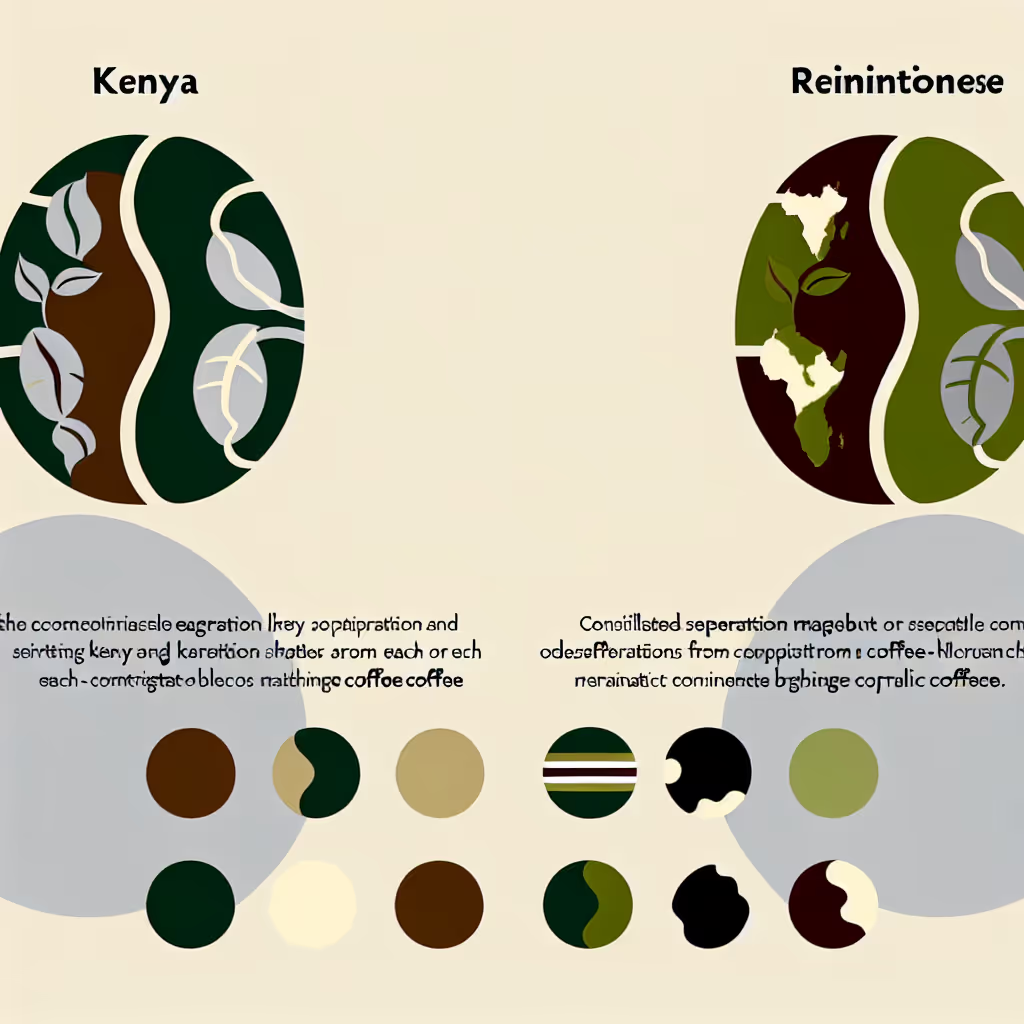Kenyan Vs. Liberian Coffee
This comparison explores the unique qualities of Kenyan and Liberian coffee, highlighting their distinct flavor profiles, growing conditions, and cultural significance in the specialty coffee market.

Brief Description
Kenyan coffee is renowned for its bright acidity, full body, and complex flavor profile. Grown in the rich volcanic soils of the Central Highlands, these beans benefit from ideal climate conditions and meticulous processing. The result is a cup that's bold, wine-like, and often described as the 'connoisseur's choice'. With notes ranging from blackcurrant to citrus, Kenyan coffee offers a truly unique and memorable tasting experience.
Liberian coffee, often overlooked in the global coffee scene, is making a comeback. Known for its unique Liberica variety, these beans offer a bold, woody flavor profile that sets them apart from more common Arabica and Robusta varieties. Grown in the lush, tropical climate of West Africa, Liberian coffee embodies the resilience and potential of the nation's agricultural sector. With its rich history and distinctive taste, Liberian coffee is slowly regaining recognition in the specialty coffee market.
Importance of Comparison
Comparing Kenyan and Liberian coffee is crucial for coffee enthusiasts seeking to expand their palate and understand the diversity of African coffee. These two origins represent contrasting flavor profiles and growing conditions, offering insights into how geography and processing methods influence coffee taste. Understanding their differences helps consumers make informed choices and appreciate the rich tapestry of African coffee production.
Key Attributes
Origin
Kenyan
Liberian


Consumer Guide
When choosing between Kenyan and Liberian coffee, consider your flavor preferences. If you enjoy bright, acidic coffees with complex fruit notes, Kenyan coffee is an excellent choice. Its high-altitude growing conditions and meticulous processing result in a bold, wine-like cup with blackcurrant and citrus notes. For those who prefer a more unique, woody flavor profile, Liberian coffee offers a distinctive taste experience. Its lower-altitude cultivation and Liberica variety produce a smoky, earthy cup. Consider brewing methods too; Kenyan coffee shines in pour-over and cold brew, while Liberian coffee excels in French press and espresso. Ultimately, trying both origins will broaden your coffee horizons and deepen your appreciation for African coffees.
Expert Opinions
Coffee expert Maria Rodriguez notes, 'Kenyan coffee is often considered the pinnacle of African coffee, known for its vibrant acidity and complex flavor profile. Liberian coffee, on the other hand, offers a completely different experience with its bold, woody notes.' Roaster John Smith adds, 'While Kenyan coffee is a staple in many specialty cafes, Liberian coffee is an exciting rediscovery that's gaining traction among adventurous coffee lovers. Its unique Liberica variety brings a new dimension to the coffee world.'
FAQs
Kenyan coffee is known for its bright acidity, full body, and complex flavor profile with notes of blackcurrant, citrus, and floral undertones. Liberian coffee, in contrast, offers a bold, woody flavor with smoky and earthy notes. The difference stems from their distinct varieties (Arabica for Kenya, Liberica for Liberia) and growing conditions.
Kenyan coffee is typically grown at high altitudes (1400-2100m) in volcanic soils, which contributes to its complex acidity. Liberian coffee is grown at lower altitudes (300-800m) in a more tropical climate, resulting in its unique flavor profile. These differences in altitude and climate significantly impact the taste and characteristics of the beans.
For Kenyan coffee, pour-over, French press, and cold brew methods are excellent choices to highlight its bright acidity and complex flavors. Liberian coffee shines in French press, cold brew, and espresso preparations, which complement its bold, woody characteristics. Experimenting with different brewing methods can help you find your preferred way to enjoy each origin.
Kenya produces significantly more coffee than Liberia. Kenya's annual production is around 50,000 metric tons, while Liberia produces about 600 metric tons. This difference reflects Kenya's established position in the global coffee market and Liberia's emerging status as it rebuilds its coffee industry.
Kenyan coffee is typically processed using washed methods, including double fermentation, followed by sun-drying. This contributes to its clean, bright flavor profile. Liberian coffee is processed using natural, washed, and semi-washed methods, which can result in a wider range of flavor characteristics, from fruity to earthy.
Liberian coffee is less well-known due to historical factors, including civil unrest that disrupted coffee production. Kenya, on the other hand, has a long-established reputation in the specialty coffee market. However, Liberian coffee is gaining recognition for its unique Liberica variety and distinctive flavor profile, making it an exciting rediscovery for coffee enthusiasts.
Conclusion
Kenyan and Liberian coffees offer distinct and contrasting experiences for coffee lovers. Kenyan coffee, with its bright acidity, complex flavor profile, and notes of blackcurrant and citrus, represents the pinnacle of East African coffee production. Liberian coffee, with its bold, woody, and smoky characteristics, provides a unique alternative that's gaining recognition in the specialty coffee world. While Kenyan coffee is more widely available and celebrated, the rediscovery of Liberian coffee adds exciting diversity to the African coffee landscape. Whether you prefer the vibrant complexity of Kenyan beans or the distinctive boldness of Liberian coffee, exploring these two origins will undoubtedly enrich your coffee journey and appreciation for African coffees.






